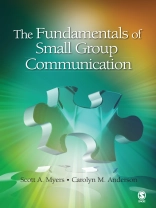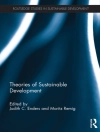The Fundamentals of Small Group Communication provides readers with the fundamentals they need to become functional and productive members of any small group. Readers are introduced to the fundamental issues faced by all small groups (such as socialization, development, ethics, diversity) and the procedures utilized by effective small groups (for example, task accomplishment, decision making, climate).
With a focus on the individual group member, this textbook encourages readers to reflect on how their communication behaviors (e.g., communication traits, verbal and nonverbal communication, listening style) and practices (e.g., their leadership style, their conflict management style) contribute to their current small group experiences.
Intended Audience
This textbook is intended for introductory courses in group communication as found in department of communication studies, leadership, marketing, management, and interdisciplinary studies.
Accompanied by High Quality Ancillaries!
An Instructors Resource CD is available to qualified adopters.
This Instructor′s Resource CD is designed to aid you in using easily The Fundamentals of Small Group Communication. The CD has been created by Scott A. Myers (West Virginia University), Katie N. Dunleavy (La Salle University), Brianna N. Loy (West Virginia University) and Paul E. Madlock (West Virginia University). Each chapter contains the following ancillary materials:
Chapter Outline
- Test Questions
- In-Class Activities
- Power Point Slides
A list of paper topics is also provided in the section titled Teaching Resources.
Tabella dei contenuti
Dedication
List of Tables, Figures, and Assessment Tools
About the Authors
Acknowledgments
Preface
1. Components of Small Group Communication
Case Study
Definition of Small Group Communication
Primary Features of Small Group Communication
Secondary Features of Small Group Communication
Types of Small Groups
Ethics of Small Group Membership
A Final Note about Small Group Communication
Conclusion
Discussion Questions
References
2. The Small Group Socialization Process
Case Study
Why Individuals Join Groups
Small Group Socialization
Model of Small Group Socialization
Outcomes of Socialization
Socialization Guidelines
A Final Note about the Small Group Socialization Process
Conclusion
Discussion Questions
References
3. Small Group Member Communication and Personality Traits
Case Study
Definition and Differentiation of Traits
Communication Traits
Personality Traits
Communication and Personality Traits in the Small Group
A Final Note about Small Group Member Traits
Conclusion
Discussion Questions
References
4. Diversity Among Small Group Members
Case Study
Definition and Outcomes of Diversity
Cultural Diversity
Demographic Diversity: Sex and Gender
Cognitive Diversity: Learning Styles
Communication Traits as a Reflection of Diversity
A Final Note about Diversity among Small Group Members
Conclusion
Discussion Questions
References
5. Models of Small Group Development
Case Study
Group Development
Developmental Models
Characteristics of Group Development
A Final Note about Small Group Development
Conclusion
Discussion Questions
References
6. Characteristics of Small Group Tasks
Case Study
Characteristics of a Task
Engaging in Decision-Making and Problem-Solving Tasks
Functional Perspective of Small Group Communication
Groupthink
A Final Note about the Small Group Task
Conclusion
Discussion Questions
References
7. Small Group Decision-Making Procedures
Case Study
Definition of Decision-Making Procedures
Types of Decision-Making Procedures
Why Use Decision-Making Procedures?
A Final Note about Small Group Decision-Making Procedures
Conclusion
Discussion Questions
References
8. Development of Small Group Roles
Case Study
Functional Approach to Roles
General Propositions of Roles
Role Development
Types of Roles
A Final Note about Small Group Roles
Conclusion
Discussion Questions
References
9. Approaches to Small Group Leadership
Case Study
Being a Leader vs. Sharing Leadership
Classic Leadership Approaches
Popular Communication Leadership Approaches
Guidelines to Enhance Leadership Competence
A Final Note about Small Group Leadership
Conclusion
Discussion Questions
References
10. Relational Communication among Small Group Members
Case Study
Definition of Relational Communication
Verbal and Nonverbal Communication
Functions of Verbal and Nonverbal Communication
Listening
A Final Note about Relational Communication
Conclusion
Discussion Questions
References
11. Conflict in the Small Group
Case Study
Definition of Conflict
Types of Small Group Conflict
Conflict-Handling Styles
Guidelines for Handling Conflict
A Final Note about Small Group Conflict
Conclusion
Discussion Questions
References
12. Cohesion and Climate in the Small Group
Case Study
The Importance of Cohesion
Definition of Communication Climate
How Communication Climate is Established
Turning a Defensive Climate into a Supportive Climate
A Final Note about Cohesion and Climate
Conclusion
Discussion Questions
References
Appendix A: Connecting Small Group Communication Concepts
Case Study
Connecting Textbook Content to Small Group Interactions
A Final Note about Connecting Small Group Concepts
Conclusion
Discussion Questions
Appendix B: Designing and Delivering Small Group Presentations
Case Study
Designing the Small Group Presentation
Delivering the Small Group Presentation
A Final Note about Designing and Delivering the Presentation
Conclusion
Discussion Questions
References
Glossary
Circa l’autore
Scott A. Myers (Ph D, Kent State University) is a professor and Peggy Rardin Mc Connell Chair in the Department of Communication Studies at West Virginia University (WVU) where he teaches courses in instructional communication, organizational communication, and communication pedagogy. His research interests center primarily on the student-instructor relationship in the college classroom and the adult sibling relationship, with his research appearing in outlets such as Communication Education, Journal of Family Communication, Communication Research Reports, and Communication Quarterly, among others. At WVU, he was recognized by the Eberly College of Arts and Sciences as a Woodburn Professor (2005–2007) and as an Outstanding Teacher in 2010. He is a former editor of Communication Teacher, a former executive director of the Central States Communication Association (CSCA), and a past president of CSCA.












